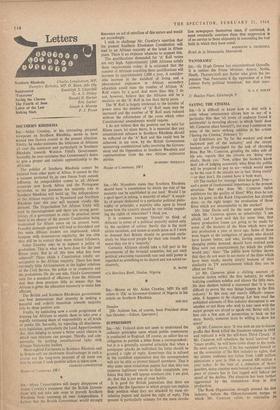lib mi Letters Southern Rhodesia Charles Longbottom, MP,
Humphry Berkeley, MP, D. Bates, Ade Olu
Suppression Randolph S. Churchill 'Panorama' G. A. S. Dibley Saving the Cinema Donald H. Harker The Fourth of June Eric Lacher Letter of the Law Joseph A. Murray Sinking Stars P. J. Prynn SOUTHERN RHODESIA SIR,—Aidan Crawley, in his interesting personal viewpoint on Southern Rhodesia, seems to have missed two factors crucial to the present situation. Firstly, he under-estimates the bitterness of Africans all over the continent and particularly in Southern Rhodesia towards Winston Field's Government. Secondly, he over-estimates that Government's desire to give a proper and realistic apprenticeship to the Africans.
The politics of Southern Rhodesia cannot be isolated from other parts of Africa. It cannot be like a vacuum protected by its own forces from outside influence. As independence comes to all African countries save South Africa and the Portuguese territories, so the pressures for majority rule in Southern Rhodesia will build up. The independence of the African majority in Nyasaland and Northern Rhodesia later this year will increase vividly this demand. The Organisation for African Unity will lend its encouragement and there are strong possi- bilities of a government in exile. In practical terms there is no chance of the present Constitution being maintained for fifteen years on its present basis. Peaceful demands ignored will lead to bloodshed and the more African leaders are imprisoned, which happens with monotonous regularity, the less able they will be to control their more violent followers.
Aidan Crawley asks us to support a policy of gradualism. This is what we have done for the past fifteen years. But in all this time what has been achieved? There exists a Constitution totally un- acceptable to the African majority. There has been extremely little Africanisation in the higher echelons of the Civil Service, the police or in commerce and the professions. On the one side, Field's Government calls for a standard of efficiency from the Africans and then does precious little to ensure that the African is given the education necessary to make him efficient.
The British and Southern Rhodesian governments can best demonstrate their sincerity in seeking a peaceful and orderly transition towards majority rule by three positive acts.
Firstly, by instituting now a crash programme of training for Africans to enable them to take over a rapidly increasing share of responsibility at all levels of public life. Secondly, by repealing all discrimina- tory legislation, particularly the Land Apportionment Act, thus helping to create a better social climate in which race relations can prosper. Thirdly, and con- currently, by holding constitutional talks with African Nationalist leaders.
Short-sighted Europeans in Southern Rhodesia and in Britain will see short-term disadvantages in such a Course but the long-term interests of all races can best be served if such positive action is taken now. CHARLES LONGBOTTOM House of Commons, SW I






































 Previous page
Previous page